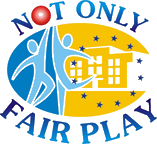
- Home
- Best
Practices - Toolkits
How to ... - Sport
Events - Guidelines
- Information
& Contacts - Project Management
A collection of student stories and initiatives about sport.
This section offers access to a collection of toolkits to promote sport at school.
-
 Physical Education Teachers
They are the main point of reference for students at school
Physical Education Teachers
They are the main point of reference for students at school
-
 Teachers
Teachers of all subjects can contribute to promote sport at school
Teachers
Teachers of all subjects can contribute to promote sport at school
-
 School Directors
Their support is a key element to promote sport at school
School Directors
Their support is a key element to promote sport at school
-
 Resources
A database of resources for teachers, PE teachers and school directors for the promotion of sport at school.
Resources
A database of resources for teachers, PE teachers and school directors for the promotion of sport at school.
Sporting events are organised in each partner country
Guidelines for policy makers willing to raise awareness on the importance of promoting sport in schools
Events
The Not Only Fair Play project has been promoted through conferences and articles.
Partnership
-
 Contractual Partners
From this section it is possible to access a description of each contractual partner of the Not Only Fair Play project.
Contractual Partners
From this section it is possible to access a description of each contractual partner of the Not Only Fair Play project.
-
 Schools
From this section it is possible to access information about the schools involved in the Not Only Fair Play Project in the 9 European countries involved.
Schools
From this section it is possible to access information about the schools involved in the Not Only Fair Play Project in the 9 European countries involved.
-
 Associated Partners
A number of associated partners officially joined the project in order to ensure the project sustainability by continuing to use the project deliverables over the next years.
Associated Partners
A number of associated partners officially joined the project in order to ensure the project sustainability by continuing to use the project deliverables over the next years.
This section of the Not Only Fair Play portal provides administrative information for the project contractual partners and for the European Commission, and is password protected.
Physical Education Teachers
Homepage > Toolkits > Physical Education Teachers

They are the main point of reference for students at school
Back to the Physical Education Teachers Toolkits
Sport as a Mean of Social Inclusion, Including Communication Strategies with Parents
A Toolkit for Physical Education Teacher
Teachers usually assess for different purposes:
• Students’ learning
• Improvement of teaching
• Communication
• Students’ motivation
There are many tools to be used in order to achieve the different purposes as for example:
• Pre-assessment is usually used to establish a base against which teachers measure learning progress over the duration of a teaching unit/course.
• Formative assessment is the in-progress evaluation of students’ learning, here the main purpose is to give teachers in-progress feedback. Formative assessment is said to be “for learning” because according to the results teachers can modify their teaching technique.
• Summative assessment is used to evaluate students’ learning at the end of a teaching unit.
So, on the one hand, effective assessment can help students to understand their achievement and help teachers improve teaching, on the other hand, it serves as a mean of communication between teachers and parents: through it parents can have a better understanding of the learning progress of their sons and give support and advice.
The Physical Education yearly plan usually includes several sections: school goals, subject objectives, expected outcomes, assessment, subject teacher, facilities, time allocation etc.
When planning, Physical Education teachers should take into account the role of sport as a mean of social inclusion and always include social factors and attitudes such as the level at which students show they are able to follow rules, play cooperatively, show respect for the others etc. in the section “expected outcomes”. These expected outcomes must be clearly stated and communicated to parents during the parent-teacher class committee.
- Key messages of the PE KLA curriculum guidePE is one of the eight learning area, this guide was drawn up to promote the learning and teaching of PE
- Assessment in Physical EducationThis is the chapter 6 of the Physical Education Curriculum Framework and it is states that assessment in PE serves many purposes and contributes to decision making. In order to support this thesis many factors, as for example the different forms of assessment, the teaching – learning – and evaluation process, are taken into account.
- New Hampshire Physical Education K-12Assessment DocumentThis document analyses in detail the different purposes of assessment.
- Using Classroom Assessment to Promote 21st Century Learning in Emerging Market Countries This paper is about six assessment strategies that should be part of a 21st century learning environment: 1) Rubrics, 2) Performance-based assessments , 3) Portfolios, 4) Student self-assessment, 5) Peer-assessment, 6) Student response systems (SRS)


